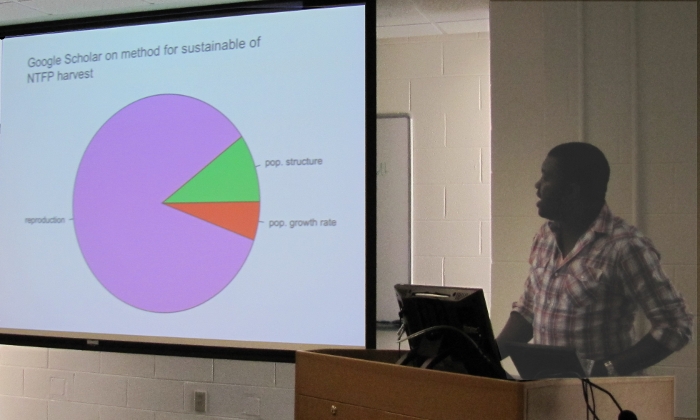NIMBioS Seminar Series
In conjunction with the interdisciplinary activities of the National Institute for Mathematical and Biological Synthesis (NIMBioS), a seminar series on topics in mathematical biology will be hosted at NIMBioS every other Tuesday at 3:30 p.m. (unless otherwise noted) in the NIMBioS Lecture Hall on the 4th floor of 1534 White Ave., Suite 400. Seminar speakers will focus on their research initiatives at the interface of mathematics and many areas of the life sciences. Light refreshments will be served beginning 30 minutes before each talk.
Time/Date: Tuesday, September 27, 2011, 3:30 p.m.*
Location: Room 403, Blount Hall, 1534 White Ave., Suite 400
Speaker:
Orou Gaoue, NIMBioS Postdoctoral Fellow
Topic:
Using a matrix population model to understand the short and long-term consequences of wild plants harvest
Abstract:
Non-timber forest products harvest shapes population dynamics by altering demographic processes such as survival, growth and fertility. Matrix population models are often used to project the effect of harvest on population dynamics and draw conclusion on the sustainability of harvest. I developed stage-based matrix population models for African mahogany (Khaya senegalensis), a critical source of fodder (foliage) and medicine (bark) for local people in West Africa. I will first show that contrary to many studies, inferring the sustainability of non-timber forest products harvest from analysis of population structure and reproduction rather than of population dynamics must be done with caution and considers the heterogeneity in landscape as well as differences in climate. Second, I will show that using asymptotic rather than the transient growth rates may underestimate the effects of harvest and possibly of other disturbances. I will discuss the management implications of these results. Finally, with evidence that harvest affects population dynamics in deterministic and stochastic environments, I will show that these effects may translate into effects on life history traits and tree senescence. Non-timber forest products harvest has been promoted as a sustainable alternative to logging and land clearing in extractive reserves. This was based on assumptions that this kind of harvest has minimal if any effect on forest structure, composition and the dynamics of harvested populations. Here I argue that more caution is needed to ensure the sustainability of harvest.
*Join us for refreshments in the NIMBioS Lobby on the 4th floor at 3 p.m.
Seminar Flyer (pdf)

NIMBioS
1122 Volunteer Blvd., Suite 106
University of Tennessee
Knoxville,
TN 37996-3410
PH: (865) 974-9334
FAX: (865) 974-9461
Contact NIMBioS



